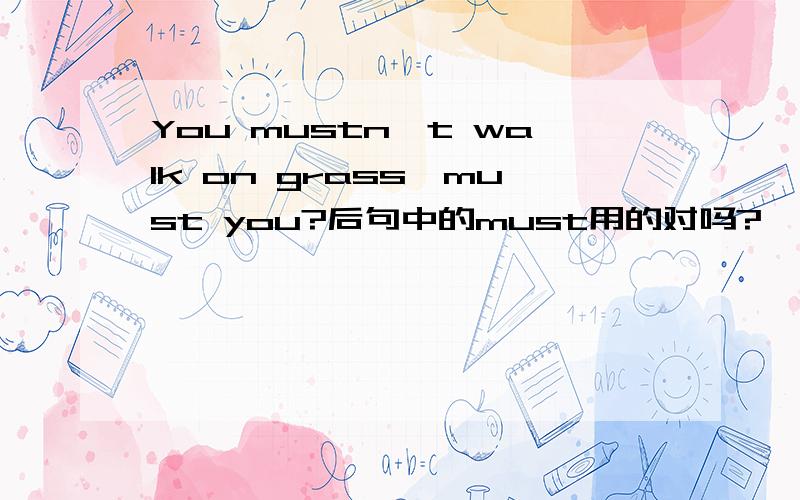You mustn't walk on grass,must you?后句中的must用的对吗?
来源:学生作业帮助网 编辑:作业帮 时间:2024/04/28 16:21:04

You mustn't walk on grass,must you?后句中的must用的对吗?
You mustn't walk on grass,must you?后句中的must用的对吗?
You mustn't walk on grass,must you?后句中的must用的对吗?
此处用法正确
当陈述句部分有情态动词must时,反意疑问部分有四种情况
(1)must表示“必须、禁止“时,反意疑问部分要用must (mustn’t) .
例 You mustn’t stop your car here,must you?你不能把车停在这地方,知道吗?
(2)must表示“有必要”时,反意疑问句部分要用needn’t.
例 They must finish the work today,needn’t they?他们今天必须要完成这项工作,是吗?
(3)当must用来表示对现在的情况进行“推测”时,反意疑问部分要根据must后面的动词采用相应的形式.
例 He must be good at maths,isn’t he?他数学一定学得很好,是吗?
should use "don't you?"
貌似不太对。。
应该用will you 吧。。
the boy is not stupid at all!
you mustn't walk ong the grass.
You mustn't walk on grass,must you?后句中的must用的对吗?
1.You mustn't walk on thegarss(都改为祈使句)2.Boys and girls you should stop talking
you mustn t walk on the grass at the moment保持句意不变You___ ____to walk on the grass at the mome
you _____ walk on the right of the road in China怎么写A.shouldn't B.should C.needn't D.mustn't
1 you must be tired,aren't you?2 you must go home right now,needn't you?3 you mustn't walk on grass,must't you?为什么都含must,反意疑问句都不一样~
Peop mustn't walk on the grass in the park对Walk on the grass进行提问怎么问
It means YOU mustn't walk on the grass.(划线提问)划的是引号里面的 _____ _____ it mean
You mustn't walk along the edge because you might fall and hurt yourself.
You mustn't play football on the road改为祈使句
you mustn't play on the road,--- 反意疑问句
You mustn't go out on school nights.变祈使句
You mustn't write on it.怎么改成祈使句?
you mustn't spit on the ground 翻译
You mustn't draw on the wall.同义句
You-------miss the lesson ,though we --------------have it on Thursday.A mustn't;needn't B needn't;mustn't C mustn't;mustn't D needn't;needn't
it's an exciting fotball match——?yes ,it is [A isn't it B is it C does it D diessn't it]2.you mustn't walk on the grass,——?【 A need you B mustn't you Cmust you D do you 3.you aren't a strange ,are you?_____,don't you remember ———— m
You ( ) walk too close to the yellow line.A.can B.can't C.must D.mustn't